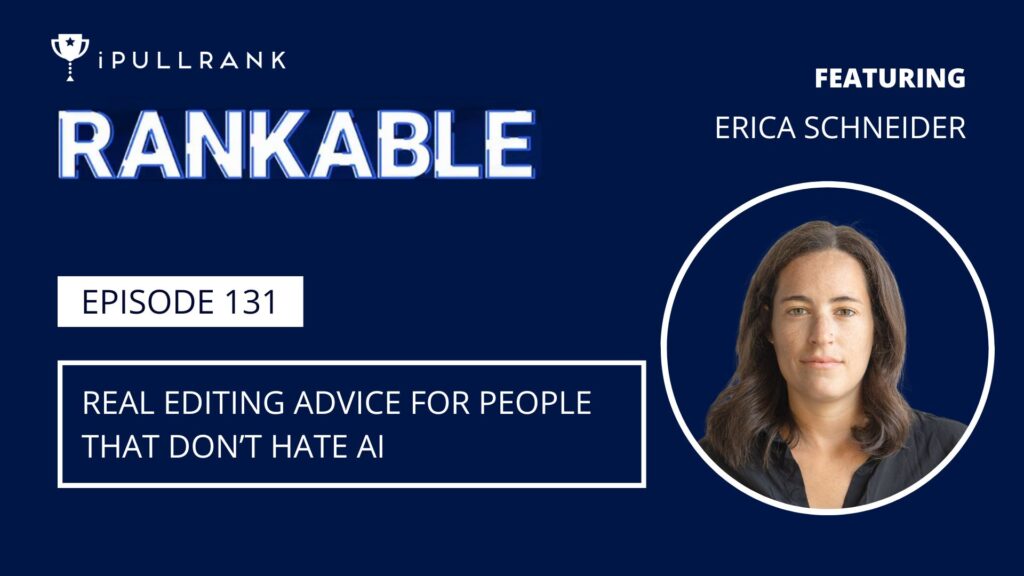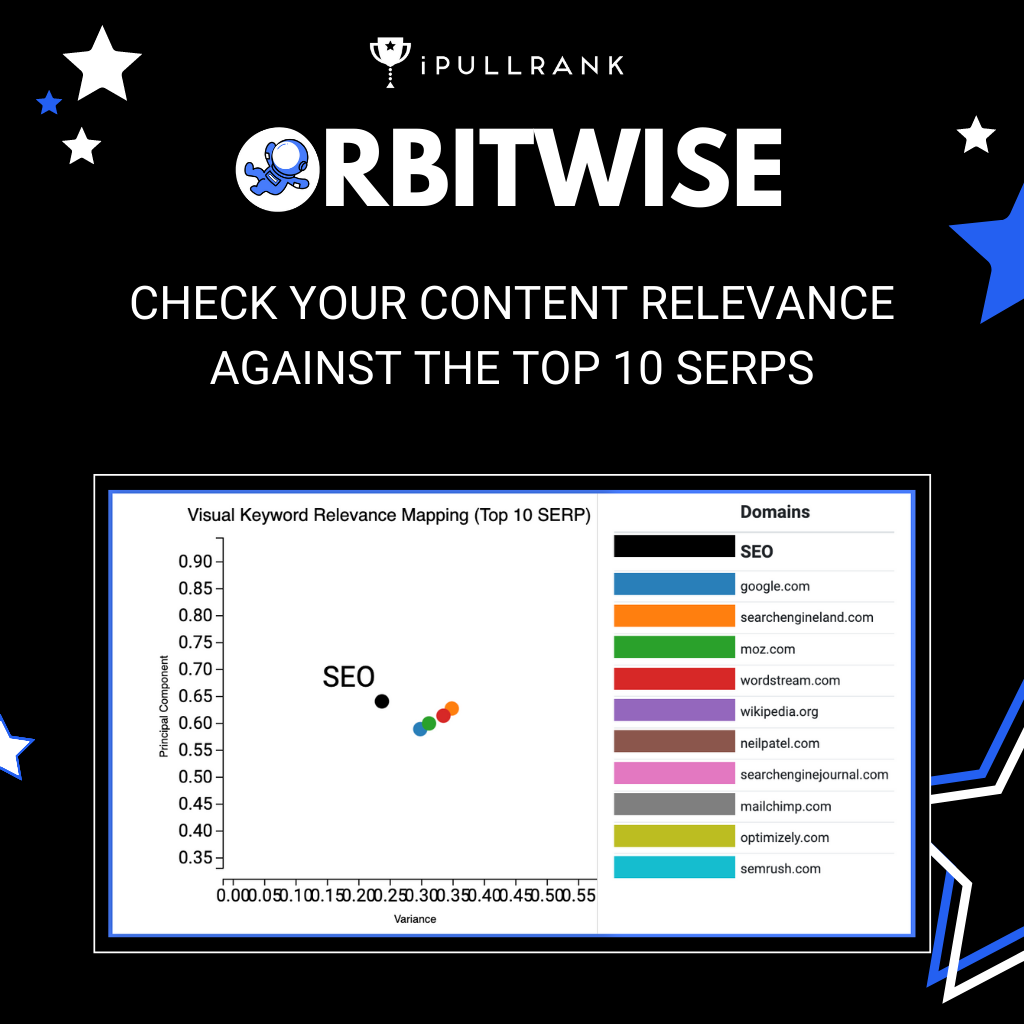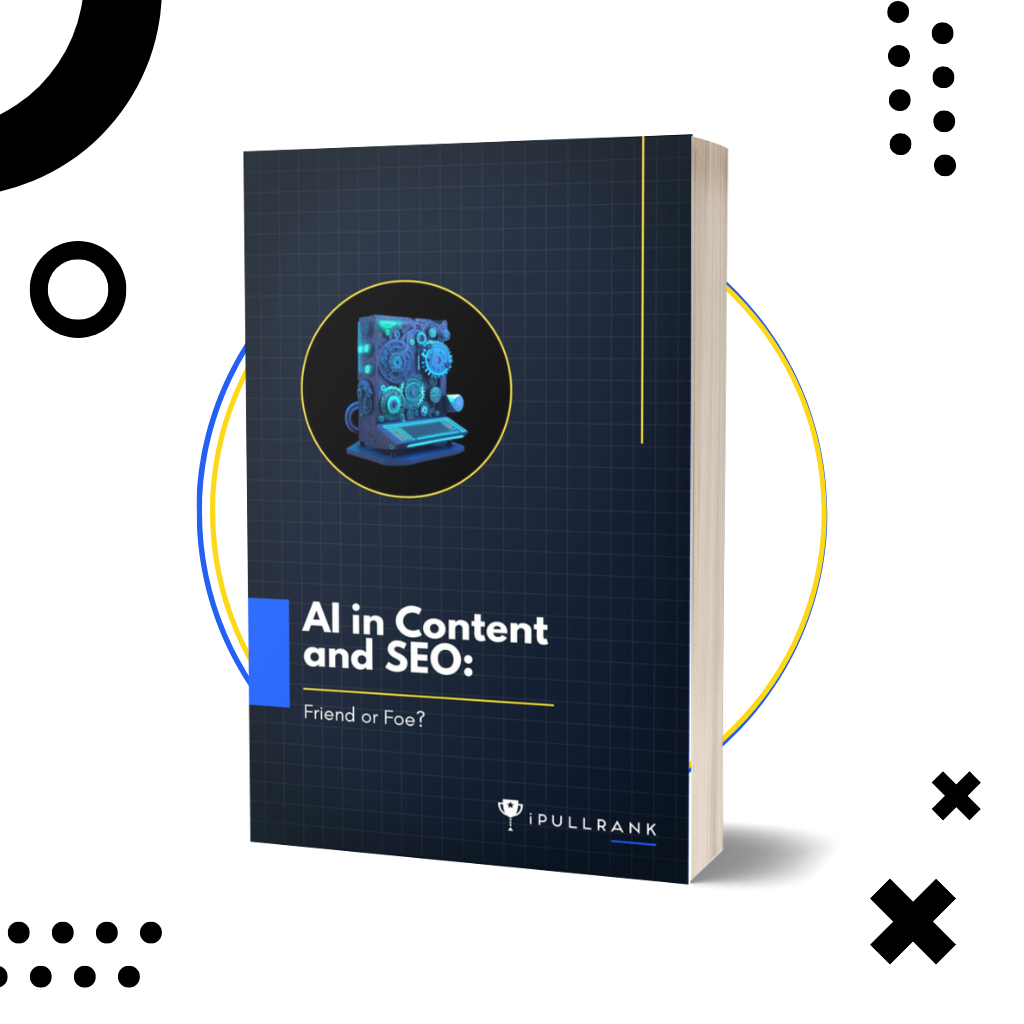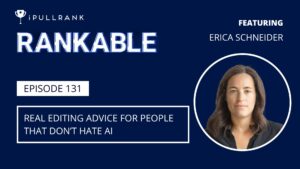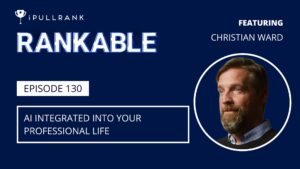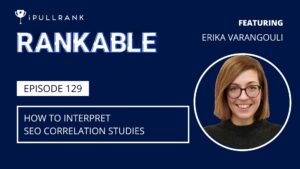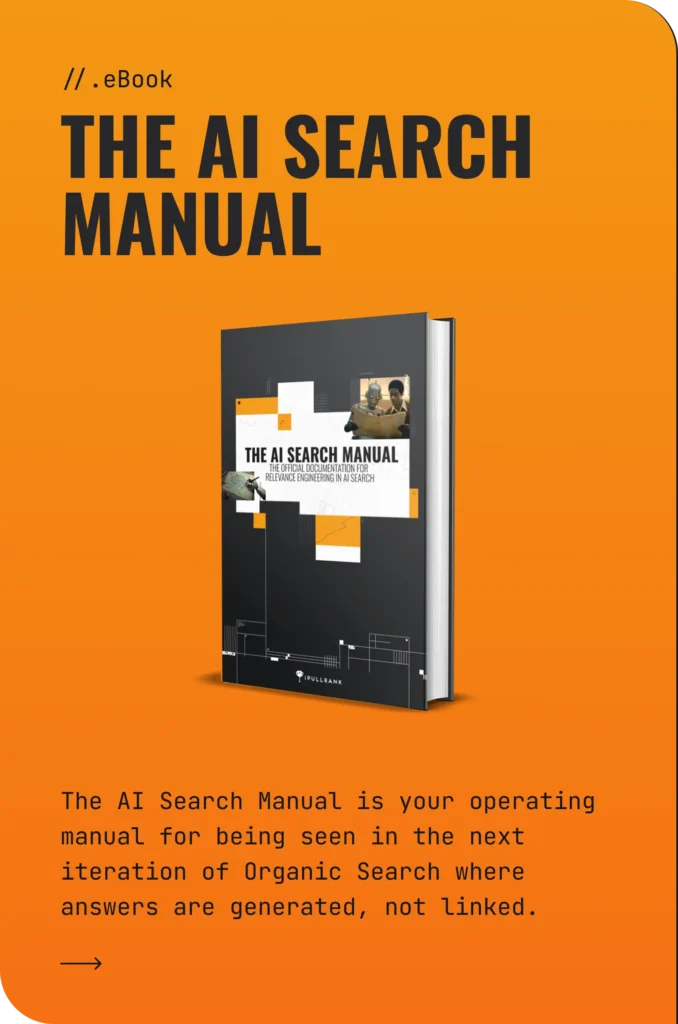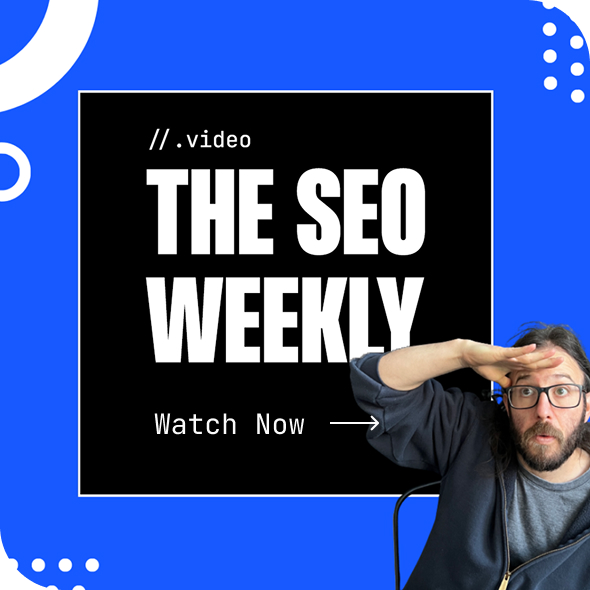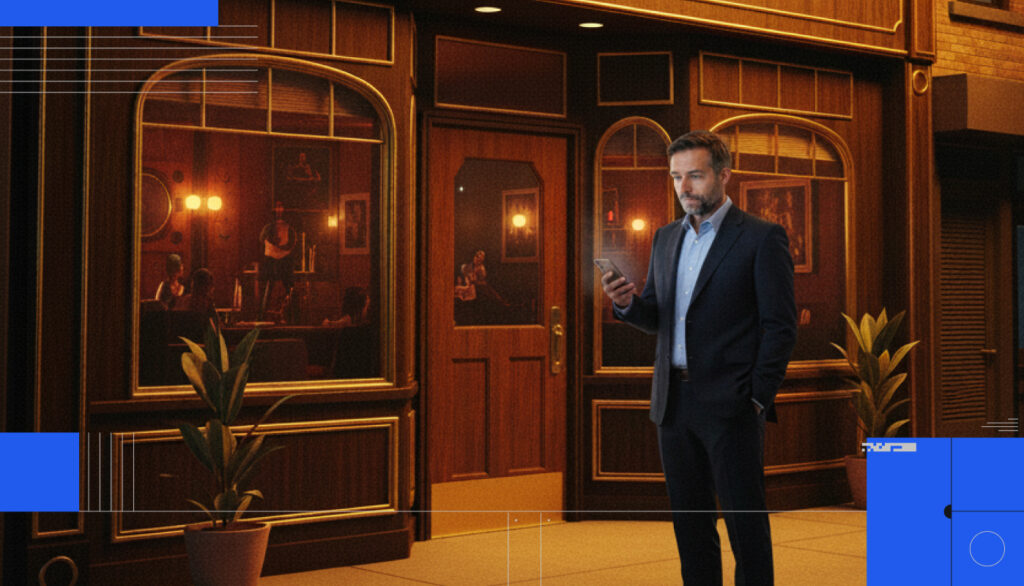The Rankable Podcast
Real Editing Advice for People that Don’t Hate AI
Featuring Erica Schneider
Episode Time Stamps
[0:00] Intro
[1:20] Starting a business with young twins
[3:20] Personal editing rituals: Developmental edits followed by copyedits
[6:35] Editing roadblocks: Using frameworks like SCQA (Situation, Challenge, Question, Answer) to move forward
[8:38] The key differences between editing for digital platforms and traditional copywriting
[10:50] How should you start a blog post so it doesn’t suck? Story driven? Data-driven?
[12:56] How will GenAI change the game for writers? It’s an assistant
[15:55] Spotting crappy GenAI content and how to fix it
[17:50] Concerns around AI killing authenticity
[20:35] Learn how to communicate clearly
[21:50] Social is exhausting. Perspectives on changing communities
[24:10] Rapid Fire Rankings
Cut through the bullshit of online gurus. Erica Schneider provides frameworks, processes, and examples that actually help content creators edit their stuff to make it more attention-grabbing, interesting, and helpful.
In episode 131, she shares her personal editing rituals, how the hell you get past your own editing roadblocks, and the key differences between crappy blog writing and attention-span-deficient social writing.
Find out what changed her perspective on the role of Generative AI writing and how she incorporates it into her writing and editing process. You’re going to learn a few neat little formulas and AI models that can speed you up while maintaining your own personal authenticity.
Listen on your favorite platform
This Week's guests
Erica Schneider
Title: Editorial Coach & Trainer
Company: Power Your Platform
Bio:
Website: Content Editing 101

Rank your best SEO marketing win:
Rank your top 3 SEO tools:
Rank your best SEO or trick or tactic:
What’s the biggest scam in SEO that you’ve recently seen?
Using AI-generated articles to rank (they always plateau)
Rank what you love most about the SEO industry:
- SEO FOMO
- Semrush newsletter
Rank your top 1-3 marketers:
What’s your Generative AI hottake?
Transcript:
Garrett Sussman: Welcome back to another episode of the Rankable Podcast. I’m your host, Garrett Sussman of iPullRank, and I am hyped. We’ve got this out of nowhere, I mean, two years of hard, dedicated, social, like, hosting and talking and calling out bullshit and being real and having a platform and showing the power of your platform. Today, I’m excited to be joined by Erica Schneider. Now, she’s an editorial coach and trainer. doing the agency game, kind of doing the B2B marketing over seven plus years, content writing, editing, taught over hundreds of entrepreneurs and founders how to communicate strategically online. She’s produced some incredibly valuable guides and courses and writing for digital platforms that like stops the scroll and gets results. And she’s got a couple of courses going on, a new one that just came out, content editing. We have a link to that in the show notes. She has her company just recently started, really exciting, Power Your Platform, excited to dive into editing, content, AI, all that jazz. Erica, how are you doing today?
Erica Schneider: Hi, I’m doing very well. Thanks for having me.
Garrett Sussman: I know you are a busy, busy person. Life work balance is a blur, but you have started this business. Before we even kind of dive into editing, what’s it been like starting this business in the throes of just like your life and everything going on?
Erica Schneider: It’s been insane. Absolutely insane. So for context, I have 13 and a half months old twins. I’m a sucker to the extreme. I love them to death. But I was just telling Garrett before we pressed record that I wish that I had kids when I was like running a super profitable business and I was a millionaire and I could just work like three hours a day and everything was passive income. Right. But that’s everyone’s dream, isn’t it? And it’s just that never happens. Also, there’s never a good time to have kids.
Garrett Sussman: Totally. I mean, that’s why like generations these days, like I didn’t have our first child until, you know, I was in my 40s. Like so many people wait, wait, wait till you’re able to have a sustainable career because single family income like just isn’t enough these days to do it. So there’s never a time, but you kind of like it’s really messed up, but you kind of have to wait to do it responsibly financially in a lot of ways.
Erica Schneider: Yeah, it’s crazy. But even though we aren’t millionaires yet, we will all be millionaires who listen to this podcast at one time or another. Yay for that. It’s been amazing. I mean, we actually started the business when I still was the head of content at Grizzle, which is a B2B content marketing agency. And it was kind of a side hustle. and we were running cohorts. I did like a little course and made a good amount of money and really, really, really enjoyed teaching people at a broader scale. And that is why ultimately after four and a half years in that role, I decided to go out on my own and just continue teaching people at that broad scale, which feels really good.
Garrett Sussman: It’s so cool. And it makes sense because you’ve taught internationally like that was kind of how you got into this. And then all of a sudden you’re doing all this and you’ve edited over three million words. So let’s let’s dive into it. What are some of your personal editing rituals? Like, could you share a couple of unique techniques that you use when you’re polishing a piece of content?
Erica Schneider: Yeah. So, there’s three types of editing, which not everybody knows. So, there’s developmental or structural editing, just like big picture macro stuff. Then there’s copy editing, which is more paragraph, sentence by sentence structure. And then there’s proofreading, which, I mean, AI tools, you’ve got Grammarly, like that pretty much catches a lot of the typos. So, it’s unique in the sense that a lot of people do it together, right? So, They open up a draft and they see a mistake in a sentence or they see that they maybe want to switch a couple sentence orders around. And then as they’re reading, they’re like, oh, actually, do I really need to include this in this piece or should I include it in a different piece? And those are separate types of editing, right? Those are small picture and big picture edits at the same time. So what I do is I separate the process. I first run a developmental edit, and if I see a copy edit, like this sentence is written in passive voice, or there’s tons of redundancy here, I’ll just leave myself a note and say, hey, come back and fix the shit out of this sentence later, or something stupid that’s gonna get me later. But I’m looking for the big picture stuff, right? Like, have I backed up my argument in the right way? If I’m writing a blog post, am I actually, is this gonna hit intent, or? Like, did I put this in here for me because I’m curious, but my audience doesn’t actually care? Or maybe because I’m curious, I should pull this out, put it in a different piece. Like, so you’re thinking big picture stuff. I do that first. Then when I’m done, I go back and I’ll do my copy edits, which is really like, the way that I see it is, Developmental editing is more of an art. Copy editing is more of a science. So you can pretty easily learn how to turn passive into active voice. Like, there is a formula. You can’t really get that wrong. But in order to back up your argument in the right way or make sure that you’re speaking to your audience’s awareness level, like, those are bigger picture, kind of more of an artsy thing. Like, there’s no right way to do that. So that’s why I do them separately, because it requires a different kind of mindset.
Garrett Sussman: To that point about developmental editing, which it’s not easy and it’s an art, can you save yourself time in the planning process? How much of this do you think is a result of the way that people write or the extent to which they use an outline and actually think through the logic of that before they dive into drafting?
Erica Schneider: 100%. So I cannot write a long form piece unless I have an outline. And vice versa, I can’t write a short form piece with an outline. So it’s kind of funny how that works for me. But yeah, I mean, the longer that your draft is, if you don’t have an outline to really think through these things logically, you are going to end up in like a spider web of thoughts as you’re writing it. And you’re going to have way too many things in there that either don’t make sense or need to be expanded on. So all of that deep thinking I recommend doing at the outline phase 100 percent if it’s long form.
Garrett Sussman: So in that capacity, when you are doing the developmental editing and you hit a tough spot, like you just can’t figure it out because we get stuck sometimes, what’s your personal go-to strategy for getting past it and finding the way to fix whatever’s nagging you in that moment?
Erica Schneider: Yeah, so for me, it always comes down to audience intent, right? Which is what, I mean, this is an SEO podcast, that’s what SEO should all be about. Like, what the hell does your audience actually need to hear? Like, what are they going to get from this piece? There are formulas that help as well. So when I was at Grizzle, we used the SCQA formula quite often, and that stands for Situation, Challenge, Question, Answer. And you can use that for your entire macro level outline, right? So if you’re not entirely sure how you want to structure something or what needs to be included, you think, okay, what is the situation of this topic that needs to be presented to my reader, right? What’s going to get them on the same page as me? How are we going to reach a common ground? And then how am I going to present a common challenge that’s going to make them feel something? right? So, I want them to understand that, like, if you want to reach this situation, it’s going to be difficult because of this, and that way you’re kind of sliding them into your answer, which is, hey, here’s a way to get over that, right? Like, I’ve got the answer, which is generally, if you do it well, you’ve hooked them, and you’ve got them to keep reading past your introduction, and then they’re interested in hearing your answer. So, that’s a good way developmentally, if you’re a little bit stuck on how to present something or what to include, you can think about, okay, what is your audience really struggling with? And how can I then present my answer in a way that’s going to make them realize that it’s going to help them overcome this challenge?
Garrett Sussman: I love the psychology behind and the way you think about that without explicitly saying, this is a psychological heuristic or framework. Obviously, one of your major successes the past year or so has been in social. Can you speak to what are some of the key differences between editing for digital platforms, whether it’s social or blog posts, versus traditional copywriting? How do these differences in the platform influence your approach to editing?
Erica Schneider: Oh my God, they’re so different. So I don’t have too much experience in traditional copywriting. But what I can say is that online, in any way that you are reading on a screen, people are skimming the shit out of things. It’s just how we read, right? And we’re presented with feeds everywhere we go. There’s just endless information overload. So right now we live in an attention economy online. I mean, newspapers as well, but you pick up a newspaper, you’re kind of intending to, okay, I’m going to go to the thing I want to read and then I’m going to read the headlines. I see that as a different experience than scrolling everything online. You can just quickly open a tab and everything’s at your fingertips. So when you are writing online, the hook is the most important part by far on social and for long form. I mean, people I absolutely suck at writing blog post introductions. I’ve got a big problem with all of the blog post introductions on page one. In today’s digital landscape, you know, like they all start with that, which is just terrible.
Garrett Sussman: Explains why AI actually like always like, we’ll get to that in a minute.
Erica Schneider: Yeah, AI does it because we do it. Like, don’t be mad at AI, like they’re taking from us. But on social, like you don’t have the, you don’t have the liberty to even, you know, pretend that you can get away with something like that because people scroll so much faster on social. So you have to have a really strong hook on social and I would argue that that hook matters even more than the introduction in long form because in long form you have the privilege of a title. which you don’t have on social. So you can get away with a really generic bad introduction that people will be like, roll their eyes at, but skim past and get to the meat of it because they were hooked by the title or they found the intent that they were looking for, right? On social, you don’t have that luxury. And I think a lot of people that come from long form that go to social don’t remember, don’t realize that they don’t have that luxury there. So you have to actually have a good first line.
Garrett Sussman: Well, to that point, and you’re mentioning how people suck at these first paragraphs in blog posts. Do you propose that people should be almost having the social approach to their blog post intros? Like, should it be? We know the whole, you write the first line, so they’ll want to read the next line, so they’ll want to read the next line. Like, what are your, like, how do you start a blog post?
Erica Schneider: Yeah, so, I mean, it depends, obviously, on the format that you’re writing in and, like, the purpose of your draft, but I love a good story. It doesn’t work for every single one or an anecdote, but something that is going to actually hook people without just relying on, like, that blanket first statement or, um, you know, data, which again is another thing that I kind of have a problem with in blog post intros, but something that is story driven or anecdotally driven. So, you know, something as simple as I think this was the first line in something I wrote about this, which is very meta, but every single blog post on page one of Google that tries to teach you about how to write well online is bullshit, essentially, or it’s fluffy, right? So if you start a blog post introduction like that, I mean, a lot of B2B companies wouldn’t get away with that, but that’s the idea, it’s interesting, as opposed to, You know, in today’s digital landscape, most blog posts on page one struggle to convey the purpose of writing online well. Like, it’s just this, like, boring neutral language that we all use.
Garrett Sussman: It’s interesting because I want to tap into the AI. We had Rob Lennon, who you are really good friends with, and you have a couple of products together with. He’s on the podcast a ways back, basically when all this stuff was getting started, which was fascinating because he was knee deep in all of it, and you’ve been working with him. And the whole generative AI for a lot of writers is a very polarizing topic in general, where we are, where we’re going. How do you think, what’s your philosophy? How do you think generative AI will change the game for editors?
Erica Schneider: Okay. So first and foremost, I don’t think you should ever use generative AI to write a long form draft. It’s just terrible at it. So I think that the reason why it’s so polarizing is because there are people, there are hacks. Hacks exist in the world. There are people that love to skip the line, scam things and just make quick money and then get out. And so anything that can be used for good can also be used for bad. So people, agencies that have gotten rid of their entire freelance writing team because they’re just using AI, that pisses people off, right? So they’ve got a gripe with that. agencies that are, or businesses that are, you know, putting a bunch of AI-generated drafts to Google, you know, and then they’re ranking, yay, look at this spike up, and then it plateaus and then goes down, right? Like, that pisses people off. But there are going to be people like that. So I think a lot of bad actors have driven people a bit nuts. Also, though, I mean, I think freelance writers have a right to be annoyed that they could be losing potential work to robots, right? Especially when the robots really suck. So I understand that. I think the use cases beyond just using it to output drafts are brilliant. I think everybody should be using AI to ask it, hey, can you identify logical gaps in what I just wrote? Hey, I’m thinking about talking about this. Can you let me know what’s the point that I’m missing? Here’s three things I’m thinking about. What am I missing? And then in my latest course, with the help of someone like Rob, who understands how to actually prompt it well, because that’s a whole other art that I’m no expert in, you prompt it well, and then it can help you Figure out where you went wrong in your writing, like, please identify my passive voice sentences and change it. Please let me know if I’ve made a claim and forgotten to support it. Please, you know, here’s a paragraph and I don’t know really how to end it, like, help me find a takeaway. Those are all bots that are in our course and it’s really cool because it’s prompted by someone who knows what he’s doing, so it’s super helpful in that way. I see it as an assistant, not a creator.
Garrett Sussman: Yeah, I love that. It’s really interesting because you hear this idea with writers where sometimes we thrive when we give ourselves constraints. And that seems to be very much the case with AI. It’s like, as long as you’re identifying the constraints, it still requires a lot of critical thinking. But if you’re putting those bots at play and putting the right constraints in place, it’s not going to do it for you. But at the very least, it should spark your own creativity.
Erica Schneider: Exactly. Yeah. I would always rather take the time to write my own first draft and then use it to help me identify gaps or edits than try to edit something fully from the beginning with AI because it’s going to take me more time to fix it. It’s just not a very good writer.
Garrett Sussman: Well, to that point in your editing process, what are some of the telltale signs when you look for that and scream, this was AI generated? And how do you actually tackle that to add your human touch?
Erica Schneider: Yeah, it’s just extremely cliche. It’s really long winded. It loves really, really long sentences and metaphors. Every time that I ask it to do something, I’m like, can you just use, like, not any metaphor, please? It’s just too much. It’s just too, too much. So it’s cheesy. It’s a cheesy little robot. And so it’s kind of obvious to me or on social with comments, you know, if it repeats exactly what you said, then you can just tell.
Garrett Sussman: But on the other end of the spectrum, have you had any experiences editing AI-generated content that actually surprised you?
Erica Schneider: Yeah. When Rob prompts it, yes, or when I’m using Rob’s prompting techniques, or someone like Rob that knows what they’re doing. I think that it’s only going to be as good as the prompt, right? So if you say, hey, please write something based on this and this style and that way, and it’s only like a three-sentence prompt, it’s probably not going to be good. But if you use one of Rob’s mega prompts, it can surprise you. Rob has something where you can you know, give it something you’ve written before and then it’ll kind of tell you, hey, this is your style. And then you say, cool, here’s a topic. Can you write something in my style? And that surprised me because it kind of did have a little bit of my style. Obviously, there was more to edit. And again, what needed to be edited was overly long winded sentences, a bit of cliches. It tells me that I’m I’m wrong sometimes when I when I do my little human like Jokes are like little human quips and it’s like oh like that wasn’t very clear and it’s like well You don’t really get what I’m doing, you know, so that’s right.
Garrett Sussman: Well, that’s that’s what it was like kill your darling situations It’s like we have like things that make us us and even yeah, you know still part of it Are you concerned about authenticity in writing going forward? I mean as this shit gets better and better and it’s going to Like are we gonna lose the best writers out there because I will be that good. I
Erica Schneider: I don’t know. It’s really hard to predict because right now it’s so not good. I hope not. I mean, I think that creativity is one of the most important parts of being human, so it would be an absolute shame. if robots could be as creative as us somehow. I love writing from scratch. It brings me joy. I think that the best writers enjoy the process of thinking through hard problems and then getting words from your mind onto paper in a way that feels really beautiful and compelling. And so I hope that we don’t. At the moment, I don’t think that that’s a risk, but in 10 years, I don’t know.
Garrett Sussman: Kind of a side note, but you’ve been doing all of these courses and it’s really interesting seeing people build their business and learn to write. What types of people are signing up with you and Rob? Because obviously you have all these conversations. What are the best type of people for what you guys are offering?
Erica Schneider: I would say entrepreneurs mostly, like coaches, consultants, freelance people in whatever capacity. Definitely, you know, founders of small businesses that don’t necessarily have a big team or a lot of money to hire ghostwriters or whatnot. Yeah, people kind of in my position, I guess, where you are doing it all or most of it on your own. And even if you plan to outsource it one day, you want to understand and learn the principles of how something works and why it works well so that if and when you do outsource it, you can have a keen eye for like what they’re giving back to you. That’s what I value as now a founder myself. If I’m going to outsource something, I want to know how to do it myself first, at least while I’m still small. I don’t know if I’ll feel that way much later, but it’s really cool to understand how to go from kind of decent to really good at something and like the principles behind that. It’s like the opposite of a hack. I mean, we give you in all the courses I’ve done with Rob, which are AI, they’re all like driven by AI bots that you can use to experiment and play right away. But they have the principles and lessons in there that explain why these bots are doing what they’re doing. So I just think that it’s important to understand those foundations.
Garrett Sussman: And I agree with that so hard. The other thing is beyond the hooks and beyond the making money and winning is like, fundamentally, you and Rob are teaching communication, right? And critical thinking, which is the most important skill going forward with all this AI sort of stuff. Do you think people in general are good communicators these days? Or do you think that’s like a skillset that really needs to be educated better?
Erica Schneider: I think it needs to be educated better. I think that especially with Authenticity, and what I mean by that is people give a shit about who they’re buying from a lot more than they used to, not just businesses, but entrepreneurs and solopreneurs as well. And so if you can’t communicate what makes you, specifically you, and what you’re doing different and interesting and trustworthy, then you’re really not going to make it. You can’t compete on features. There’s just too many competitors doing all of the same shit out there. You have to understand how to communicate as yourself and well, and I think there’s a lot more of that to be learned, and I think people are cottoning on to that, which is a good thing. It means that people are understanding what’s required, what’s the assignment.
Garrett Sussman: Yeah, and so much of it is still about community. I got to ask you before we segment to to the the rapid fire rankings. How are you feeling about social? Are you still enjoying? I’m going to call Twitter fuck X or LinkedIn. Or are you over it? Like where how are you feeling about it? Because they change so much.
Erica Schneider: Yeah, I mean, so I’ve been doing it for two years now, almost every day, but definitely not every day. I took maternity leave. I don’t post every single day in a row, but I show up quite consistently. And I would say I kind of hate Twitter right now. It’s just like not my favorite place. I don’t I don’t know what the deal is. I don’t know if people left in a mass exodus when Elon took over. I’m not sure what it is, but it feels different. So, I’m not loving it as much as I used to, but I have always loved LinkedIn and still do. So, I’m on both every day, but I used to have more fun on Twitter. It just feels a bit dead lately is the best way to explain it.
Garrett Sussman: What do you like about LinkedIn? What keeps you going there?
Erica Schneider: just feels like people say more valuable shit there, you know? Like LinkedIn’s just a bunch of, I mean, Twitter’s just like a bunch of bullshit half the time, honestly. I don’t even know why, like I scroll my feed, I think Jack Appleby asked the other day, does anyone actually like scrolling their feed on Twitter? Like this is a legitimate question. And I read that and was like, Not really, like I’m not really getting much here, you know, but on LinkedIn, scroll my feed, you know, go to people’s profiles that I know that I’m going to like and I read what they’re writing and it’s interesting, I’m learning stuff, I want to contribute to the conversations there. And it’s all about conversations, right? I just don’t really feel like having that many conversations on Twitter right now because it’s just, I don’t know, it’s not that compelling.
Garrett Sussman: No, I feel you. It’s like for me, I feel like the LinkedIn is is the more like, like engagement and conversations, whereas Twitter, I feel like I do feel like I’m like, oh, there’s cool shit. Like people are posting cool shit that’s like not on my radar, like it’s become a better discovery engine. But that said, it’s like you have to you have to. Someone said it best is like there’s just way too much noise on.
Erica Schneider: There’s a lot of noise. There’s a lot of noise on Twitter. Yeah.
Garrett Sussman: Okay. Rapid Fire Rankings. Let’s do this. I know you’ve been out of the SEO game, so we’re going to focus this on content and marketing, but still have some SEO stuff in there. So we’re going to put some music up. Are you ready for this? Yeah, let’s do it. Okay, let’s do it. Rapid Fire Rankings. Rank your best SEO or marketing win that you’ve had.
Erica Schneider: Okay. So when I was at Grizzle Pipe Drive, if you all know them, they’re a sales CRM tool. They wanted us to optimize hundreds of pages for them, literally hundreds. And so I was in charge of this project. And so every single day I would try to get through, I don’t know, two to four of these like really, really old articles that were just short and needed to be totally updated, rewritten and SEO optimized. And so I was heads down on that project for a couple of months and we ended up Having a 33% growth in tracked keywords that ranked positions one to three in a month’s time when we were done with that, which was really, really cool, made the hard work feel worth it. But damn, that was a hustle.
Garrett Sussman: That’s really cool because it’s like you put the work in there, you don’t know, and then you get the results and that’s what it’s all about. Rank your top three SEO tools.
Erica Schneider: I really only have two that I used often, so I’m just going to stick with the two. ClearScope and SEMrush for sure. I mean, we also used Ahrefs, but then SEMrush became kind of one of our clients at Grizzle, so SEMrush for the win. But ClearScope is just amazing. It was my favorite tool to use. I mean, it helps you with outlines, it helps you with understanding tangential topics that you should include. And it’s really like with the plugin, it’s so easy to find your secondary keywords and get them in there to get an A-plus score. So I absolutely love that.
Garrett Sussman: When you’re on the spot, do you have a favorite content or editing tool that you use?
Erica Schneider: Besides your brain? I mean, I use Grammarly, but I never, I mean, I never turn it on until the end because it always tries to tone down my personality as well. There’s Hemingway app, which can help you a little bit, but honestly, not really. Not really. Just kind of use myself and whatever bots Rob builds for me.
Garrett Sussman: I was going to say, even sometimes with Grammarly, you have to flick away and be like, I get it, but no.
Erica Schneider: No, I never turn it on until the end and it’s just for typos.
Garrett Sussman: Rank your best SEO trick or tactic.
Erica Schneider: Um, so my personal, like, I was always really proud of this, that I’m really, really good at getting secondary keywords to feel naturally placed. in blog posts. So I don’t know if that’s a trick, but a lot of freelance writers would really struggle getting the final five secondary keywords in that we really wanted to get in there. And I would pop in and just be like, I got this. I’m good.
Garrett Sussman: That’s like a magic of pulling a rabbit out of a hat sort of trick. This is a fun one. What’s the biggest scam in SEO or content that you’ve seen recently?
Erica Schneider: I mean, it’s what we talked about already with these AI-generated drafts. And then, you know, I’ve seen on LinkedIn some really awesome breakdowns of like, hey, these agencies that are ranking and it’s awesome, like, look, look, they only show you like the hockey stick. Here’s what happens after that. And it’s just like, blah, blah, blah. So it’s just bullshit. Like, why are we, what is the point of ranking if it’s shitty content? Like, what is the point? I don’t understand. It’s like clickbait, just nonsense. So.
Garrett Sussman: You’re not making the world a better place if you’re putting that out there. Rank what you love most about SEO or content and editing.
Erica Schneider: Okay. My favorite part of content is when you can actually meet your customers’ intent and need and help them solve a real problem or make them think about something in a new way that’s then going to drive them to your site and hopefully to your tool. And then obviously the inverse of that is when you’re just like, oh, yay, we’re on page one and it does nothing and nobody goes to your site or cares at all about what you’re saying.
Garrett Sussman: Yeah, it’s so much more. I mean, there’s so much strategy behind it. Rank your best learning resource.
Erica Schneider: my best learning resource. So I’m subscribed to SEO FOMO by Aleyda Solis. I’m not sure if I’m pronouncing that right. I always open that just to kind of try to stay up to date with what’s going on. Obviously, I pay attention to your tweets, what you’re talking about. But yeah, and then whatever I see on LinkedIn usually, which is way more valuable than Twitter in terms of SEO stuff going on.
Garrett Sussman: I appreciate that. Thank you. And yeah, no, Aleyda is fantastic. That is the best SEO newsletter. There are a lot of newsletters out there these days. Yes. Rank the top one to… This is the most impossible question, but rank the top one to three SEO or marketers that you most look up to or admire.
Erica Schneider: Okay. So obviously you, like you’re out, you’re out there doing good stuff. Um, Aleyda Solis is great. There’s also Mordy Oberstein. Is that how you say his name? Yeah. I met him at the SEMrush global marketing day. He’s a cool guy. Um, and then I really liked Chima Mmeje. I’m going to pronounce that totally wrong as well. I’m so sorry. Um, she, is just like a force when it comes to topic clusters and teaching people how to do SEO, like a really foundational, fundamental level. And I like her vibe. I like her attitude about things as well. She’s also no bullshit, which I love.
Garrett Sussman: Yeah, she’s fantastic. In your world of social beyond that, are there just a few people you rattle off that are just great follows that you recommend?
Erica Schneider: In general? Yeah. I mean, Amanda Natividad’s always been up there for me. She’s like my favorite person. Hilarious. Yeah, she’s hilarious. Like, she’s just good. She’s just good vibes. Obviously, there’s Katelyn Bourgoin. I can’t pronounce I can’t pronounce anyone’s name at all. There’s my business partner, Kasey Jones. She’s brilliant at helping people build confidence. Obviously, Rob Lennon. Those are just off the top of my head. Yeah.
Garrett Sussman: We’ll get those links to all those profiles so you can follow those good folks. What’s your generative AI hot take?
Erica Schneider: Use it or lose it, but don’t use it for the wrong reasons. Use it in the right way, which is all the ways we talked about here. But don’t pretend that it doesn’t exist because you will get left behind. And it is a really great way to spark creativity and save time, especially after you’ve done the hard work of writing. There’s so much that you can use it for to check yourself.
Garrett Sussman: Seriously, it’s like a calculator type of computer. It’s here. And finally, rank your number one cause or charity that you’d want to promote.
Erica Schneider: Yeah. So PFLAG is, I think they were the world’s first foundation to help LGBTQ plus people. It was founded by a mom and a son. And there’s always this group of PFLAG moms at every Pride that I’ve ever been to. They just have their t-shirt. I just love it. It’s like it’s parents that are like, hey, we support you, you know, which is probably the most important thing if you’re a queer person to have support from the people around you. Even if they don’t understand it, they still freaking support you and love you. So, yes, as a queer parent now, I just think that that is a brilliant foundation.
Garrett Sussman: Everything hits different when you’re a parent, but that’s a great organization. Thank you so much for joining me. What like a freaking awesome conversation. It’s fun to geek out and speculate and talk and dive deep. Erica, if people want to find you online, what’s the best way to get in touch?
Erica Schneider: Yeah, so you can go to Erica’s, my name, on Twitter, even though I’m loving LinkedIn more. So it’s Erica Schneider over there. I’ve got like a green turquoise background, if that helps you find me. You can read my newsletter. It’s called Cut the Fluff. I’ve actually got two newsletters. There’s another one called Power Your Platform. So yeah, just find me on social. You’ll find links to everything I do there.
Garrett Sussman: And I know this will get published in a few weeks, so it might be after your live event, you’re doing a live event. That said, do you have plans for anything like that in the future? Obviously, if they sign up for your newsletters, they should see the stuff that you’re doing.
Erica Schneider: Yeah. So actually, my business partner, Kasey Jones, and I, we’re going to be doing live events every two weeks for the foreseeable future. We’re trying to build up a really big library for the community that we’re kind of quietly, but soon not so quietly building, which is linked to our cohort. And that helps people build strong personal platforms so that they can build their online authority. So yeah, keep an eye out.
Garrett Sussman: I got to get in on that. That’s awesome. Thank you again for being my guest. This has been awesome. Thanks so much for having me. My name is Garrett Sussman of iPullRank. We will catch you next week. See you later.

Host: Garrett Sussman
Title: Demand Generation Manager
Garrett loves SEO like the 90s loves slap bracelets.
Each week he interviews the most interesting people in the world (of SEO). When he’s not crafting content, he’s scouting the perfect ice coffee, devouring the newest graphic novels, and concocting a new recipe in the kitchen.
Get insights, stories, and strategies from a range of practitioners and executives leading the charge in SEO.
Enjoy this podcast? Check out Garrett’s video show round-up of everything search engine optimization: The SEO Weekly
